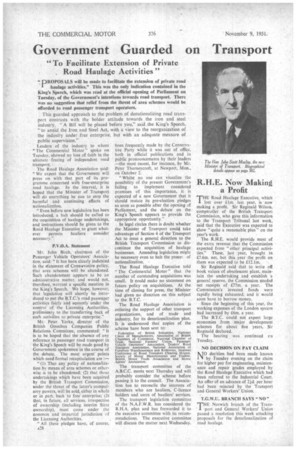Government Guarded on Transport
Page 30

If you've noticed an error in this article please click here to report it so we can fix it.
" To Facilitate Extension of Private Road Haulage Activities"
paoposAis will be made to facilitate the extension of private road i haulage activities." This was the only indication contained in the .King's Speech, which was read at the official opening of Parliament on Tuesday, of the Government's intentions towards road transport. There was no suggestion that relief from the threat of area schemes would be afforded to rood passenger transport operators.
This guarded approach to the problem of denationalizing road transport contrasts with the bolder attitude towards the iron and steel industry. "A Bill wilt be placed before you," said. the King's Speech, "t6 annul the Iron and Steel Act, with a view to the reorganization of the industry under free enterprise, but with an adequate measure of
public supervision,"
Leaders of the industry to whom "The Commercial Motor" spoke on Tuesday. showed no loss of faith in the ultimate freeing of independent road transport, The Road Haulage Association •said: "We expect that the Government will press on with that part of its programme concerned with free-enterprise road haulage. In the interval, it is hopedthat the Minister of Transport will do everything he can to stop the harmful and continuing effects of nationalization.
" Even before new legislation has been introduced, a halt should be called to the acquisition of haulage undertakings, and instructions should be given to the Road Haulage Executive,to grant what ever permits hauliers • consider necessary."
P.V.O.A. Statement
Mr. John Birch, chairman of the Passenger Vehicle Operators' Association. said: "It has been clearly indicated in the statement of Conservative policy, that area schemes will be abandoned. Such abandonment appears to be an administrative matter, and would not. therefore, warrant a specific mention in the King's Speech. We hope, however, that legislation' will shortly be introduced to put the B.T.C.'s road passenger activities fairly and squarely under the control of the Licensing Authorities, preliminary to the transferring back of such activities to private enterprise."
Mr. Peter Yorke, director of the British Omnibus Companies Public Relations Committee, commented: "it is to be hoped that the absence of any reference to passenger road transport in the King's Speech will be made good by Government spokesmen in the course of the debate. The most urgent points which need formal recapitulation are :— " (1) That any policy of nationalization by means of area schemes or otherwise is to be abandoned; (2) that those. undertakings which have been acquired by the British Transport Commission, under the threat of the tatter's compulsory powers. will be sold, either in whole or in part, back to free enterprise: (3) that, in future, all services, irrespective of ownership (including interim State ownership), must come under the common and impartial jurisdiction of the Licensing Authbrities.
" All 'these pledges have, of course, A/8
been frequently made by the Conservative Party while it was out of office, both in official publications and in public pronouncements by their leaders —the most recent, for instance, by Mr. Peter Thorneycroft, at Newport, Mon., on October 2.
" Whilst no one can visualize the possibility of the present Government's failing to implement considered promises of this importance, it is expected of a new Government that it should restate its pre-election pledges as soon as possible after the opening of Parliament, and the debate on the King's Speech appears to provide the appropriate opportunity."
In legal circles there is doubt whether the Minister of Transport could take advantage of Section 4 of the Transport Act to issue a general direction to the British Transport Commission to discontinue the acquisition of haulage businesses. Amending legislation might be necessary even to halt the procet of nationalization, The Road Haulage Executive told "The Commercial Motor" that the number of outstanding acquisitions was small. It could make no statement on future policy on acquisitions. At the time of closing for press. the Minister had given no direction on this subject to the B.T.C.
The Road Haulage Association is enlisting the support of other transport organizations, and of trade and industry, for its denationalization plan. It is understood that copies of the scheme have been sent to:
Federation of British Industries, National Union of Manufacturers, Association or British Chambers of Commerce, National Chamber of Trade National Farmers' Union, Passenger Vehicle Operators' Association. Traders' Road Transport. Association, National Association of Furniture Warehousemen and Removers. National Conference of Road Transport Clearing Houses, Society of Motor Manufacturers and Traders, British MOtOr Trade Association and Motor Agents' Association.
The transport committee of the A.B.C.C. meets next Thursday and will probably consider the scheme before passing it to the council. The Association has to reconcile the interests of members who are hauliers, C-licence holders and users of hauliers' services.
The transport legislation committee of the N.A.F.W.R. has considered the R.H.A. plan and has forwarded it to the executive committee with its recommendations, The executive committee will discuss the matter next Wednesday.




















































































